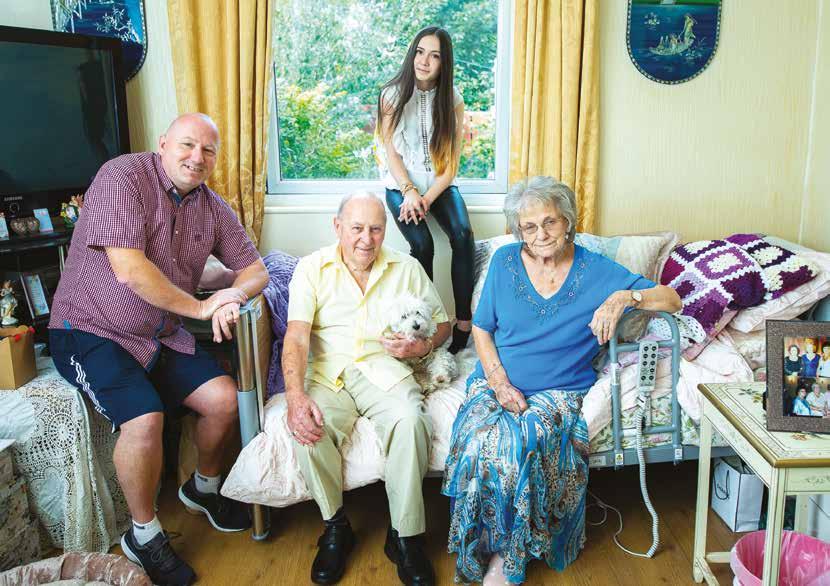
4 minute read
BETTER TOGETHER
They say it takes a village to raise a child. We discover how keeping people well and out of hospital is all the better through teamwork.
Paula McNulty is an experienced occupational therapist. But sometimes her patients will have more than therapy needs.
Paula McNulty. When this happens Paula can draw on the expertise of any one of a group of professionals. She coordinates the Integrated Care Team (ICT), a group that includes GPs, physiotherapists, social workers, mental health, allied health professionals, matrons, district nurses, voluntary services, pharmacists and administrators.
They’re all ready to step in and provide whatever’s necessary for the person to recover or stay well – not just their health but often their life.
The team will come together to look at factors that may be contributing to that on goals set by the person themselves. They’ll then call on the best source of help. Paula chairs the Aintree, Croxteth and Norris Green team. She says every case is different. “It could be health related, but equally someone may need help with finances or to be reconnected with their community. We could step in to help an elderly carer who has their own health issues.
“Parents who are unsure of the development stages for their baby may benefit from a health visitor giving them little nuggets of knowledge, to reduce anxiety and help them be the mum and dad they want to be. They can advise them on other services that can support them, such as children’s centres.”
“As a team we have years of experience and rich resources and knowledge to tap. It’s good to know that one of us might have that single piece of information that could make a big difference to someone’s life.”
A CHANCE AT LIFE
Paula recalls a 50 year old lady with Asperger’s Syndrome, epilepsy and difficult to control diabetes (the diabetes could lead her to present with erratic behaviour which caused great distress to her family).
“When we met her she was very distressed and frustrated. During a recent hospital stay she had been prescribed medications which stabilised her mood. But we all wanted more for this lady who had missed out on so many life opportunities.”
The team linked in with a specialist diabetes nurse at the Royal Liverpool Hospital and a specialist epilepsy nurse at the Walton Centre. Liverpool City Council’s telehealth service provided an epilepsy sensor mat for her bed at home, so the team could keep a record of seizure episodes. The Trust’s Asperger service advised on the best way to communicate with the patient about staying well, and a learning disability nurse accompanied her social worker on visits to offer support and insight into her particular needs relating to her medical problems.
The team worked with her family, signposting them to an autism passport which can help other agencies understand her needs when family can’t be around her.
They’ve recently linked with the student support team at a local college. The lady is going to the Trust’s Life Rooms and using the Household into Work scheme to access programmes to prepare her for full study.
Says Paula: “She’s now in a position to fulfil her ambition of studying. Her family is delighted too. With the benefit of the wisdom and knowledge of everyone involved this lady is finally having the life she deserves.”

Margaret and Brian with son Chris and granddaughter Erin.
BRIDGING THE GAP
Brian Dailey was struggling with his rehabilitation following a stroke. Brian, 82 was main carer for his wife Margaret who has complex health problems and is in constant pain.
Margaret was being supported by The team links with hospitals and GPs so that Leah Dean supports the Dailey family. Leah Dean, who leads the North Liverpool integrated care, reablement and assessment service (ICRAS). The service brings together specialist teams of health and social care professionals, to prevent hospital admission by providing the care someone needs, in their own home. Leah felt Brian needed extra support, but was concerned at the impact if he went into when someone is discharged a tailored care package is already in place. They can respond within a few hours of the referral, to assess what the person may need. “We have such a diverse team that we can bring in support quickly. We’ll keep reviewing the situation as someone becomes more able. We take our lead from the patient, we’re here for them.” would be difficult looking after both parents. I didn’t know where to start, but they just came in and took away the stress. “The way they approached it was fantastic. Nothing was an issue. Each day they’d turn up and say ‘we arranged for this therapy, or that service’, or for some equipment to be delivered. They even washed my mum’s hair. We couldn’t have asked for better support.” hospital. She recalls: “They’re such a lovely couple; they’ve been together 50 years. I knew that being separated would be distressing for them.” The couple’s son Chris is an older people’s mental health nurse with Mersey Care. He was both reassured and astounded at the speed of the response from the team. Leah says being able to support patients like Brian and Margaret is rewarding. “That side of health care doesn’t get much exposure, but it can make such a big difference, it’s so
She drew on the support of her ICRAS “If they’d been apart my mum and dad rewarding.” colleagues to provide a care package for wouldn’t have lasted long but I knew it
Brian so he could stay at home. 21










